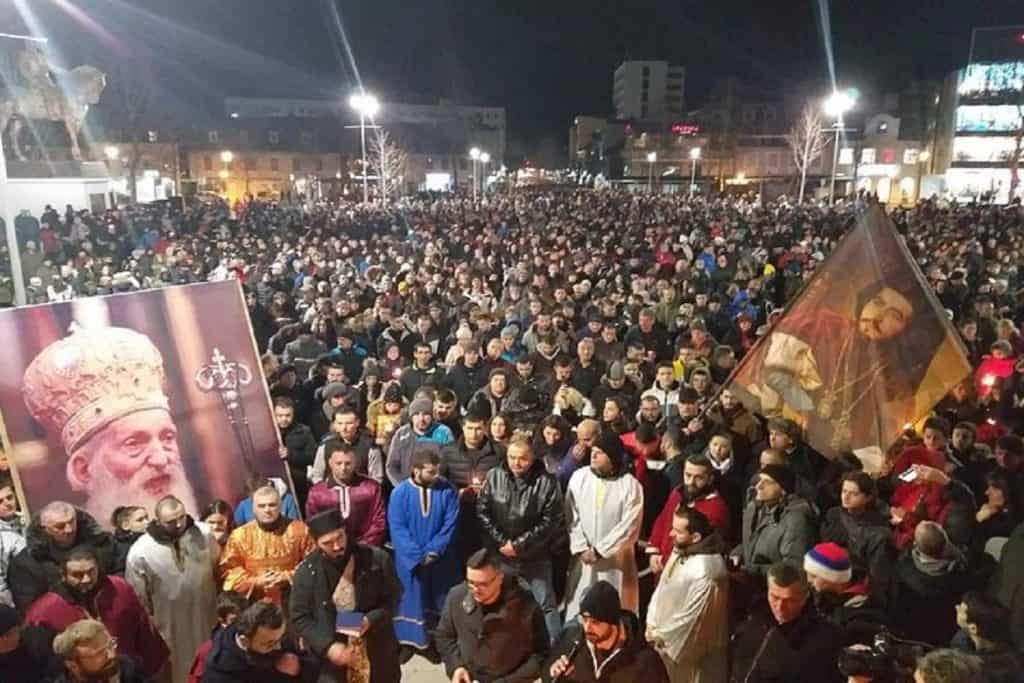By Slaviša Milačić
Twice-wekly cross processions, which begun in late December in response to the Montenegrin government`s declaration of its right to confiscate Serbian Orthodox Church properties and interrupted by the coronavirus pandemic, continued on June 14. As before, a large number of citizens participated in cross processions, all with the aim of defending the Serbian Orthodox Church in Montenegro.

Recently police forces demolished on June 10 a guest house in the monastery Saint Basil of Ostrog (Sveti Vasilije Ostroški) of the Serbian Orthodox Church in city of Ulcinj. This provoked anger among the Orthodox population of Montenegro.
The reason for such strong pressure on the Serbian Orthodox Church is the fact that the Government of Montenegro has entered in the final phase of creating a Montenegrin identity. After the separation from Serbia in 2006, the creation of the Montenegrin language, the question of the Church came up.
Although there has been a Montenegrin Orthodox Church in Montenegro since 1993, the problem is that Montenegrin Church is almost without believers. So today the Montenegrin Orthodox Church operates more as an NGO. At the same time, almost all Orthodox population in Montenegro are belivers of the Serbian Orthodox Church.
And that is exactly the problem for finishing Montenegrin identity. That is why Milo Djukanovic, who rules for 30 years in Montenegro, has decided to use violent methods to create a Montenegrin church and to force the belivers of the Serbian Orthodox Church to become belivers of Montenegrin Orthodox Church.
According to the 2011 census, 28.7% of Montenegrin citizens identified themselves as Serbs. While 42.88 percent of citizens speak Serbian, and 36.97 Montenegrin. According to the report of Ministry for Human and Minority Rights of Montenegro from 2015 the institutional discrimination of Serbs in Montenegro can be best seen.
– In the Court of Appeals, out of 27 employees, there is NO Serbs,
– In the administrative court, out of 21 employees, there is NO Serbs,
– In the Constitutional Court, out of 32 employees, there is one Serb. Thus, in a total of 126 employees in these courts, there is only one Serb.
– In the General Secretariat of the Government of Montenegro, out of 106 employees, there are NO Serbs,
– In the Ministry of Science there are NO Serbs, in the Ministry of Labor and Social Welfare there are NO Serbs, in the Ministry of Justice there are NO Serbs.
– The Protector of Human Rights employed 18 people, none of whom were Serbs.
Ministries with one Serb are: the Ministry of Foreign Affairs, the Ministry of Culture, the Ministry of Health, the Ministry of Human and Minority Rights.
In the meantime, the parameters that illustrate the discrimination of Montenegrin citizens who declare themselves as Serbs have become even more pronounced.
Also, the people who got a job in the civil service until Milo Đukanović turned to anti-Serbism, acquired the conditions for retirement. On the other hand, according to the unwritten rules of Montenegrin Government, young people who declare themselves as Serbs have little chance of getting a job in the state administration, while in private companies close to the ruling regime, employment is also hampered.
Representatives of Serbia also speak publicly about the difficult situation of Serbs in Montenegro. Serbian Patriarch Irinej and Serbian President Aleksandar Vucic agreed that the position of Serbs in Montenegro is extremely bad. Serbian Orthodox Church Patriarch Irinej and President Aleksandar Vucic agreed that Serbs in Montenegro were in much worse position than they were during the Ottoman Empire or the WW II Nazi puppet Independent State of Croatia.
“What is going on in Montenegro wasn`t happening either during the Ottomans or even coummunists,“ Patriarch Irinej told in a joint news conference with Vucic. He added he belived the aim was to expel the Serbs as ustashas did in NDH and to destroy the Serbian Orthodox Church.
Vucic said he understood Serbian Orthodox Church view, but that he hoped Patriarch Irinej was not right about Montenegro`s authorities intention to expel the Serbs.
“We have to be more cautious because we don`t want to do to them what they have done to us“, Vucic said.
He added that“ the issue is that politics in interfering in the church`s internal order.“
“We will use all democratic means to inform the international public about what is going on,“ the President said.
Vucic added that what is happening in Montenegro was just the beginning and that “an attempt to create an Orthodox church in Kosovo, then in Bosnia and Herzegovina could be expected.”
Next year in Montenegro, the census is on the agenda. Therefore, the basic task of the political representatives of the Serbian people in Montenegro must be to find a way to change the balance of power in the next elections, because their result will significantly determine the results of the census. The extension of the political status quo in the next years will inevitably lead to significant reduction in the number of Serbs
The President of Serbia, Aleksandar Vucic, also spoke about that. The President of Serbia reminded that a census should be held in Montenegro in 2021, that according to the last census, 28% of Montenegrins declared themselves as Serbs, and that many did not declare themselves that way “in order to save their jobs and families”.
“Through the previous research, we could not find 15 percent of Serbs, and according to the last research, there are over 20 percent of them … What is our job is to help preserve (serbian) identity, in accordance with international and public law and European heritage,” stated Vucic.
It is a fact that the current government in Montenegro is assimilating Serbs into ethnic Montenegrins by pressure. However, the fact also is that a significant part of the Montenegrin population voluntarily feels as ethnic Montenegrins. In accordance with the above, Serbs must look only at their national interests. And this primarily means protection against assimilation. It is necessary to act on that plan as soon as possible. Parliamentary elections will be held in Montenegro in September
Serbs must have their own Serbian party in these elections and not to be a part of a civic bloc, as before. And the civic part of the opposition need to get out to the polls alone. However, what must be the main goal of the Serbian parties is to come to power and not to fight against Milo Djukanovic. After the election, if the opposition would have more votes, Milo Djukanovic and his party should certainly be sent into political retirement.
However, the chances are slim for that. Because of that, Serbs like in Kosovo, should collect their votes and, after the elections, start negotiations on their status with those who are the choice of others ethnic groups. Otherwise, Serbs in Montenegro will face even more difficult times.
Author: Slaviša Milačić (Historian and independent analyst. Montenegro)
(The views expressed in this article belong only to the author and do not necessarily reflect the editorial policy or views of World Geostrategic Insights).







